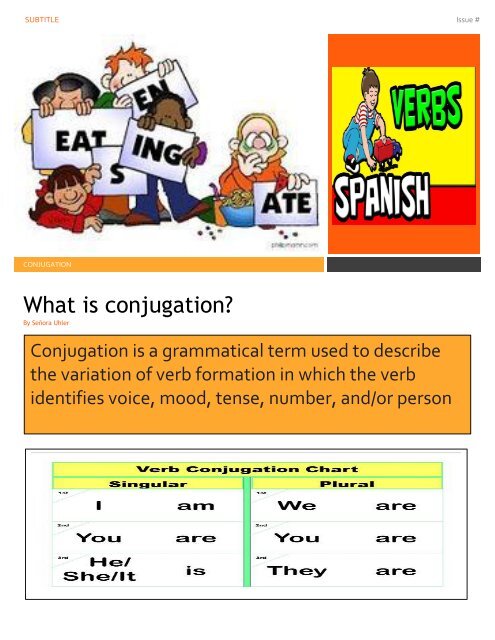Create successful ePaper yourself
Turn your PDF publications into a flip-book with our unique Google optimized e-Paper software.
SUBTITLE Issue #<br />
CONJUGATION<br />
What is <strong>conjugation</strong>?<br />
By Señora Uhler<br />
.<br />
Conjugation is a grammatical term used to describe<br />
the variation of <strong>verb</strong> formation in which the <strong>verb</strong><br />
identifies voice, mood, tense, number, and/or person<br />
Page #
SUBTITLE | Issue # 2<br />
Subject Pronouns:<br />
The subject of a<br />
sentence is a person<br />
or thing that<br />
preforms the action<br />
of the <strong>verb</strong>. Subject<br />
pronouns replace<br />
the subject of a <strong>verb</strong>.<br />
We don’t say:<br />
Josie is tall and Josie<br />
is blonde.<br />
We say:<br />
Josie is tall and she is<br />
blonde.<br />
<strong>Spanish</strong> Subject Pronouns<br />
Yo I Nosotros/as We<br />
Tú You(s) Vosotros/as<br />
Él He Ellos They(m)<br />
Ella She Ellas They(f)<br />
Usted You (for.) Ustedes You(pl)<br />
Conjugation of Verbs ending in <strong>AR</strong><br />
INFINITIVE VERBS ENDING IN <strong>AR</strong><br />
HABL<strong>AR</strong><br />
ESCUCH<strong>AR</strong><br />
NAD<strong>AR</strong><br />
ESQUI<strong>AR</strong><br />
MONT<strong>AR</strong><br />
DESCANS<strong>AR</strong><br />
CANT<strong>AR</strong><br />
TRABAJ<strong>AR</strong><br />
BAIL<strong>AR</strong><br />
DIBUJ<strong>AR</strong><br />
PATIN<strong>AR</strong><br />
CAMIN<strong>AR</strong>
SUBTITLE | Issue # 3<br />
Let’s Conjugate!<br />
CAMIN<strong>AR</strong><br />
Caminar- to walk<br />
Caminar<br />
Camin-<br />
Descansar<br />
Yo add-o camino<br />
Tú add-as caminas<br />
Él add-a camina<br />
Ella add-a camina<br />
Usted add-a camina<br />
Nosotros/as add-amos caminamos<br />
Montar<br />
Ellos add-an caminan<br />
Ellas add-an caminan<br />
Ustedes add-an caminan<br />
Él camina en el parque He walks in the park.<br />
Yo camino al cine. I walk to the movies.<br />
Marí y yo caminamos. We walk.<br />
¿ caminas tú? Do you walk?<br />
Mari y Juan caminan. They walk.
SUBTITLE | Issue # 4<br />
A. Fill in the spaces with the appropriate subject pronouns for<br />
the subjects provided.<br />
1. when you refer to yourself _______________<br />
2. when you are talking to a friend _______________<br />
3. to refer to a girl _______________<br />
4. to refer to a boy _______________<br />
5. To ask and answer singular formal question _____________<br />
6. To talk about we (masculine) _______________<br />
7. To talk about we (feminine) ______________<br />
8. To talk about they (masculine) ______________<br />
9. To talk about they ( feminine) ______________<br />
10. To ask and answer questions about you plural __________<br />
B. Write the correct subject pronoun for the subjects indicated.<br />
1. Gabriela ____________________<br />
2. Evan y Jorge ____________________<br />
3. Lola y yo ____________________<br />
4. Hector ____________________<br />
5. Señor Alverez ____________________<br />
6. Evelina y tú ____________________<br />
7. Yo ____________________<br />
8. Tú ____________________
SUBTITLE | Issue # 5<br />
C. Fill in the spaces with the appropriate subject pronouns for the subjects<br />
provided.<br />
1. when you refer to yourself _______________<br />
2. when you are talking to a friend _______________<br />
3. to refer to a girl _______________<br />
4. to refer to a boy _______________<br />
5. To ask and answer singular formal question _____________<br />
6. To talk about we (masculine) _______________<br />
7. To talk about we (feminine) ______________<br />
8. To talk about they (masculine) ______________<br />
9. To talk about they ( feminine) ______________<br />
10. To ask and answer questions about you plural __________<br />
D. Write the correct subject pronoun for the subjects indicated.<br />
9. Gabriela ____________________<br />
10. Evan y Jorge ____________________<br />
11. Lola y yo ____________________<br />
12. Hector ____________________<br />
13. Señor Alverez ____________________<br />
14. Evelina y tú ____________________<br />
15. Yo ____________________<br />
16. Tú ____________________<br />
E. Write the <strong>Spanish</strong> infinitive translation of the following <strong>verb</strong>s.<br />
1. To study ___________________<br />
2. To teach ___________________<br />
3. To listen ___________________<br />
4. To talk __________________<br />
5. To work __________________<br />
6. To Read __________________<br />
7. To use __________________<br />
8. To run __________________<br />
9. To sing __________________<br />
10. To dance __________________<br />
11. To write __________________<br />
12. To swim __________________<br />
13. To ride __________________
SUBTITLE | Issue # 6<br />
F. Write the grammatical –ar <strong>verb</strong> ending associated with the following subject pronouns.<br />
1. Yo __________________<br />
2. Tú __________________<br />
3. Él __________________<br />
4. Ella __________________<br />
5. Usted __________________<br />
6. Nosotros __________________<br />
7. Nosotras __________________<br />
8. Ellos __________________<br />
9. Ellas __________________<br />
10. Ustedes __________________



